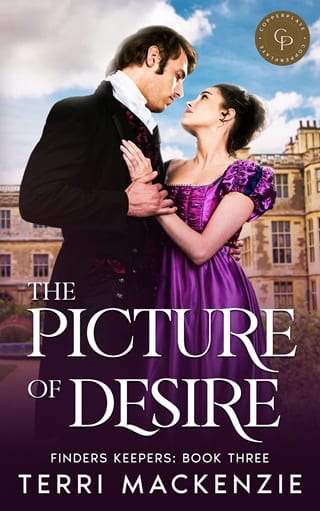Chapter One
PRESENT DAY
February 1815
Louisa rubbed at the smear of paint on her fingers as she absently made her way to the Blue Room. Her mind was on the painting she had left behind, and she was still thinking of colour and composition when she opened the door after her butler's announcement. Inside, Mr Vincent Knight stood in the middle of the floor, a smile on his face and his hands behind his back.
"Lady Bolton," he said with a bow, and presented her with a bouquet of perfect hothouse roses. "For you."
Irritation scorched her more pleasant thoughts of paint. It had taken her long enough to be able to bear the scent of oils again without feeling ill, and now she had been torn from it to receive a man carrying the most predictable flower known to mankind. Next, no doubt, he would ask for her hand in marriage. That was always how these calls went, and she began to wish she had told Avery not to admit him. Widowhood had given her an agreeable amount of freedom, but it had also left her with a considerable fortune, and no one, not even her mother, could believe that she did not intend to hand it to another.
Independence was precious.
Men, in her experience, were not.
"Thank you," she said, accepting the roses. Up close, their perfection became uncanny—the closest one to get to unnatural while still being of nature. "Please, sit. Would you like anything to drink?"
"No, I thank you. Don't trouble yourself." He strolled to the sofa and sat down.
The irritation sharpened into anger, although she had been the one to offer him a seat. The fact was, he had been one of her late husband's friends, a man Lord Bolton had sponsored into the ton thanks to Knight's habit of brown-nosing. He might have been a good man—she had never troubled herself to find out—but his association with her husband was unforgiveable. And there was something about his russet hair that made her think of a fox, sly and watchful. Ever since Bolton's death, he had struggled to keep his hold on High Society, and had used his association with her and her late husband to procure invitations where he would otherwise have been denied.
That, too, was something she could not overlook.
"To what do I owe this pleasure?" she asked.
"Have I not made my intentions plain?" He viewed her with some amusement. "I would have thought you were aware of my hopes."
Her shoulders stiffened. "I believe I have also been plain."
"Is that so?" His gaze strayed to the painting above the fireplace. The Blue Room was the only one used exclusively for entertaining, and the only space in which she still housed any of Lord Bolton's paintings. If she could have had her way, she would have tossed the unobtrusive landscape into the fire. Unfortunately, the Prince of Wales had taken a liking to Bolton's work and had the habit of dropping in unexpectedly to discuss her late husband's love of art. "What a delightful painting, Lady Bolton. Your husband was very talented."
Her jaw snapped together. Enough of this. "If you came here to offer for me, then I'm afraid you are labouring under a misapprehension."
"Oh?"
"That I intend to marry again. I do not."
An expression crossed his face, too fast for her to parse. Not a look of broken-hearted agony, but something closer to panic. Irritation. Frustration. No doubt, like her other suitors, he was more beguiled by Bolton's fortune than her charms. But as her wealth was the only thing of worth Bolton had left her, she saw no purpose in handing it to another man.
"You are not yet thirty," he said after a long moment. "You cannot think of spending the rest of your days alone."
"Can I not?" She raised her brows. "I am perfectly fulfilled."
"Your mother led me to believe you would welcome my suit."
Her mother. Teeth firmly gritted to prevent an unwise response, she crossed to the window and looked out. The frost had melted under a merry winter sun, and the city was in full swing. Carriages rattled by, young ladies crossed the street arm in arm, and footmen followed their charges with their arms full of packages. Any other day, it was a sight that would make her smile. Now, all she could think of was the way every person she had the misfortune to meet thought that she would welcome the opportunity to shackle herself to another man.
After a marriage like the one she had endured, she would rather have plunged in front of a bolting horse.
"My mother was mistaken," she said, raising her gaze to look at the frost still trimming the tiled roof of the house opposite. "Believe me, sir, I have no wish to waste either of our time."
"This is your final answer?"
"I have no other to give," she said calmly, turning and observing him. "And I would rather not be obliged to refuse you—for both our sakes. Better you are saved the indignity of asking."
His nostrils flared and his jaw tightened. Not, she noted, the expression of a man so deep in love he might drown in it.
She had seen that but once.
"I will not change my mind," she said, keeping her voice even. "And truly, I think you would be happier with another lady. One you hold genuine affection for."
"Is that what you are saving yourself for? Love?"
"I meant what I said, Mr Knight. I have no intention of marrying again, no matter the provocation, and no matter who offers for me."
This sentiment, while true, hid the fact that even if she had been tempted to marry again, she would not have chosen one of her husband's cronies.
He rose to his feet, approaching her with his hat in his hand—the picture of humility, if only she could bring herself to believe it. "Is there nothing I can do to prevail on you to change your mind? To prove the depth of my affection?"
She almost snorted. There was not affection here, unless it was for the size of her fortune. Admittedly, no debutante this Season had a dowry to match, but she doubted he needed her wealth; few men did. But they were greedy enough to want it.
"There is nothing, sir," she said. "I will not change my mind."
His lips thinned and his eyes roved across her face, grey and cold and angry. For a moment, he hesitated, rocking on his heels as though he was tempted to go in for another round, pitting his will against hers.
He would not succeed.
After a few more seconds, however, he merely clenched his teeth. "I see there is nothing more to do but take my leave."
"I hope your disappointment is of short duration."
He swept her a mocking bow and replaced his hat on his head. "Let no one say I didn't try. Good day, Lady Bolton."
And to think she had changed her dress for this. She rang the bellpull once again. "Goodbye, Mr Knight. Avery will see you out."
Henry Beaumont always rose with the dawn. The war had given him the habit; the crushing weight of his responsibilities back in London had maintained it. And it was during his early breakfast that there was a commotion by the door, a familiar slurred voice telling Jarvis, the butler, that he did not require assistance. Sighing, Henry rose, putting aside his teacup and folding his paper, and went to see what the problem was.
His father squinted at him from the hallway, his hat lopsided and his cane dropped across the floor. Jarvis was keeping an impassive distance as his father pointed a finger at Henry.
"You," he said.
"Me," Henry said. "Would you like some coffee? I find it is tolerable this time of the morning."
"Coffee? Bah!" Spittle flew from his father's mouth. "In my own home?"
"It is a practice that is becoming increasingly common. Though of course, you may go out to a coffee house if you wish."
"Damn your impudence. I'm going to bed."
"How much was it this time?" Henry asked, reaching for the patience he found so little of these days. Perhaps it was his attempt to assimilate back into London society after years fighting a war that had seemed nonsensical at the best of times.
His father regarded him with a crafty eye. "No need to concern yourself, Eynsham. It'll come back around. You'll see."
"We're late with wages already."
"The servants can wait. We feed and house them, don't we?" His father waved an imperious hand and stumbled for the stairs. Rather than let Jarvis watch his father fall, Henry took his arm and hauled him upstairs.
"There are more bills than I can count on your desk," Henry said. "If you would just allow me to open and address them—"
"Oh, those. Throw them in the fire. I've got a few months before it gets bad yet."
Henry clenched his jaw. He was not yet the earl, and so his power was limited without his father's consent, which was yet to be forthcoming.
But if they did not turn things around soon, they would be forced to lose the London house. In an attempt to repair some of the damage, Henry had instructed that no fires were to be lit in the parlour, study, or bedrooms. The house was persistently cold, but at least they were saving on coal. Same for candles: no more than ten lit at any one time. He had personally gone without new clothes and boots since the summer, and he had asked his mother to do the same, although she had refused.
At least his sisters were married and out of the house, in successful households of their own. He couldn't like his youngest sister's choice of husband, but there was no denying that Jacob Barrington loved her, no matter his other faults. As for his elder sister's husband, the Duke of Norfolk—he was the only reason Henry could afford to send Oliver to Oxford, much as he hated being beholden. His pride stung, but there was nothing else for it if he was going to allow Oliver an education. And an education Oliver must have.
Henry would sacrifice just about anything to provide for his brother. Once Oliver was settled with an occupation and income of his own, the worst of his worries would be allayed.
"Father," he tried once they were at his bedchamber door. "If you don't give me the means to pay the servants soon, they will leave."
"Jarvis has been in the family for nigh on forty years."
"And this may be his last if he is not treated with respect, sir."
His father turned the doorknob with a decisive snort. "Give me until tomorrow, my lad. It'll turn around, you'll see."
Henry was not a stranger to the gamester's habit of throwing good money after bad, but it had never frustrated him more than then.
"Let me be plain with you," he said, following his father into the room. Daylight strained through the partially pulled curtains. "If you do not change your ways, we will lose this house and our comfortable life."
"You have become so serious, Henry." His father groaned as he dropped into the armchair before the fire. "Why is it so cold?"
"Because I left instructions to not build fires in our rooms unless it's strictly necessary."
The Earl's eyes narrowed. "This is necessary."
"No," Henry said, turning as he left the room, "it is not."
He closed the door firmly on his father before returning downstairs and finishing his breakfast. His mother had yet to rise when he left the house for the bank. Drummond's was open when he walked through the doors at past ten o'clock, although it was clear they had not expected to see a young lord request a meeting. Nevertheless, the request was granted readily enough, and Henry was ushered into a small room with a window overlooking the street, and a well-dressed man whose quiet elegance denoted him as being a man of fashion.
"Mr Pickford, Lord Eynsham," said the man, giving his hand a shake. "Come, sit. What would you like to discuss with me?"
"The state of my father's affairs," Henry said bluntly. "I want to know if we'll lose the house in Grosvenor Square."
Mr Pickford looked at him for a long, assessing moment. "Your father isn't present."
"No."
"I cannot remember the last time your father saw me. Or," he said carefully, "the last time a viscount came to the bank and did not request a meeting in the convenience of his own home."
"Suffice to say my own home is not convenient." And Henry did not believe in the arrogance that led rich men to make demands on the time of those less fortunate. "Can you help me?"
Mr Pickford sat at his desk. "You strike me as a sensible man, if I may say so, my lord."
"Thank you."
"If you demonstrate great forbearance and drastically reduce the demands made on your account, you may keep the house."
But not the servants or the horses , Henry thought bitterly. "And if we do not?"
"Then perhaps you will last until the summer, but there is no doubt about it. If things do not change, you will be obliged to sell. In fact, I recommend that you consider the necessity of your property in Bath."
Henry's nostrils flared. When he was younger, his mother had taken them all to Bath over the summer, and it was there he had first met Louisa Picard, although now the world knew her as Lady Bolton.
To sell the Bath house would be to relinquish his last connection to the past. And it was foolishly sentimental, damn him, but he had no desire to do that.
"I'll speak with my father," he said, rising. "Are you certain that we will make it to the summer?"
"Unless something changes, you still have a few months before you must face the worst. But may I suggest in the strongest terms, my lord, that you begin cutting back on your spending?"
Henry gave a grim smile as he rose. "Unfortunately, sir, I am not the one you would have to convince, and the likelihood of that is slim indeed. I shall have to take matters into my own hands."
Mr Pickford was too polite to ask, but Henry understood his questioning glance.
"Marriage," he clarified. No matter what his feelings around the prospect of finding a rich wife were, he would have to do so, or they would all be ruined.
 Fullepub
Fullepub 



